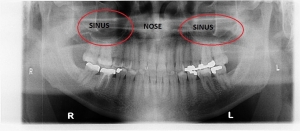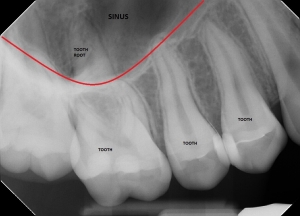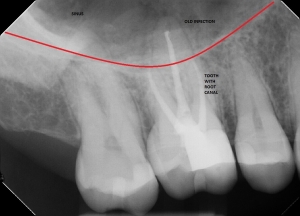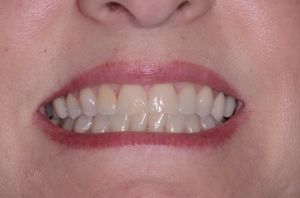Many people do not realize the intimate connection between teeth and sinuses. We tend to disconnect our teeth and mouth from our general health, while the mouth-body connection is a big part of or general health. Our sinus and teeth are related in a number of ways.
The maxillary sinus is an air space in the face, behind the cheekbones. This air space is connected with our nose and is lined with a mucous membrane. Many people ask why we have these air spaces in our face. While we really don’t know the best explanation is to think how heavy our face would be if it was solid bone. They also aid in humidifying air and in immune responses of the body.

The roots of the back upper teeth sit at the base of the maxillary sinus. Many times the sinus is wrapped around the roots with only a thin layer of bone separating the nerves in the teeth from the sinus membrane. This thin separation makes any issues in the teeth, or sinus, related.
When you get sinus pressure or a sinus infection the inflammation of the sinus membrane and pressure from fluid in the sinus can put pressure on the nerves that give feeling to the upper teeth. It is not uncommon for a patient to complain of a toothache in one or ALL the upper back teeth, when it is a sinus infection that is causing the problem.
Nobody wants an unnecessary root canal only to still be in pain after the procedure. Every dental textbook has a few pictures of “old school” dentistry where 5 root canals were done in a misguided attempt to stop the pain from what was a sinus infection. Modern dentistry has tests to determine if it is sinus related or tooth related pain and treat it accordingly.

Mistakes can be made the other way also; teeth that are infected can cause sinus issues. If a tooth dies due to decay or trauma, the infection can abscess. A dental abscess is a long term infection at the tip of the root that often goes unnoticed. The infection produces puss that builds up pressure until it finds a place to drain out. In an upper tooth the root tips are so close to the sinus that the puss can drain into the sinus.
The sinus issues that result from a tooth abscess connected to the sinus range from: a constant runny nose, clogged sinuses on one side, redden eye on one side, a musty or metallic smell or taste in the nose. A visit to your medical doctor rather than your dentist will many times result in sinus medications or antibiotics. These may temporarily help with the symptoms but they do not address the cause of the sinus trouble. Eventually the problem comes back or the infection gets so large that the tooth starts to exhibit symptoms also.
In these instances, the proper treatment is to identify the tooth or teeth and treat them with either root canals or extraction. It is amazing how many patients will tell us that their sinus is clear for the first time in years after we treat an upper tooth. They did not even mention the issue to the dentist, thinking that the two issues were unrelated. Understanding the mouth body connection is vital to get a complete picture of your over health, and to help get the proper diagnosis and treatment.

Modern dentistry that treats the whole body, not just the teeth, helps us to avoid the mistakes of the past and improve your overall health.
If you have any questions or would like a consultation with Dr. Saydyk, click on the link to schedule an appointment or give our office a call.



